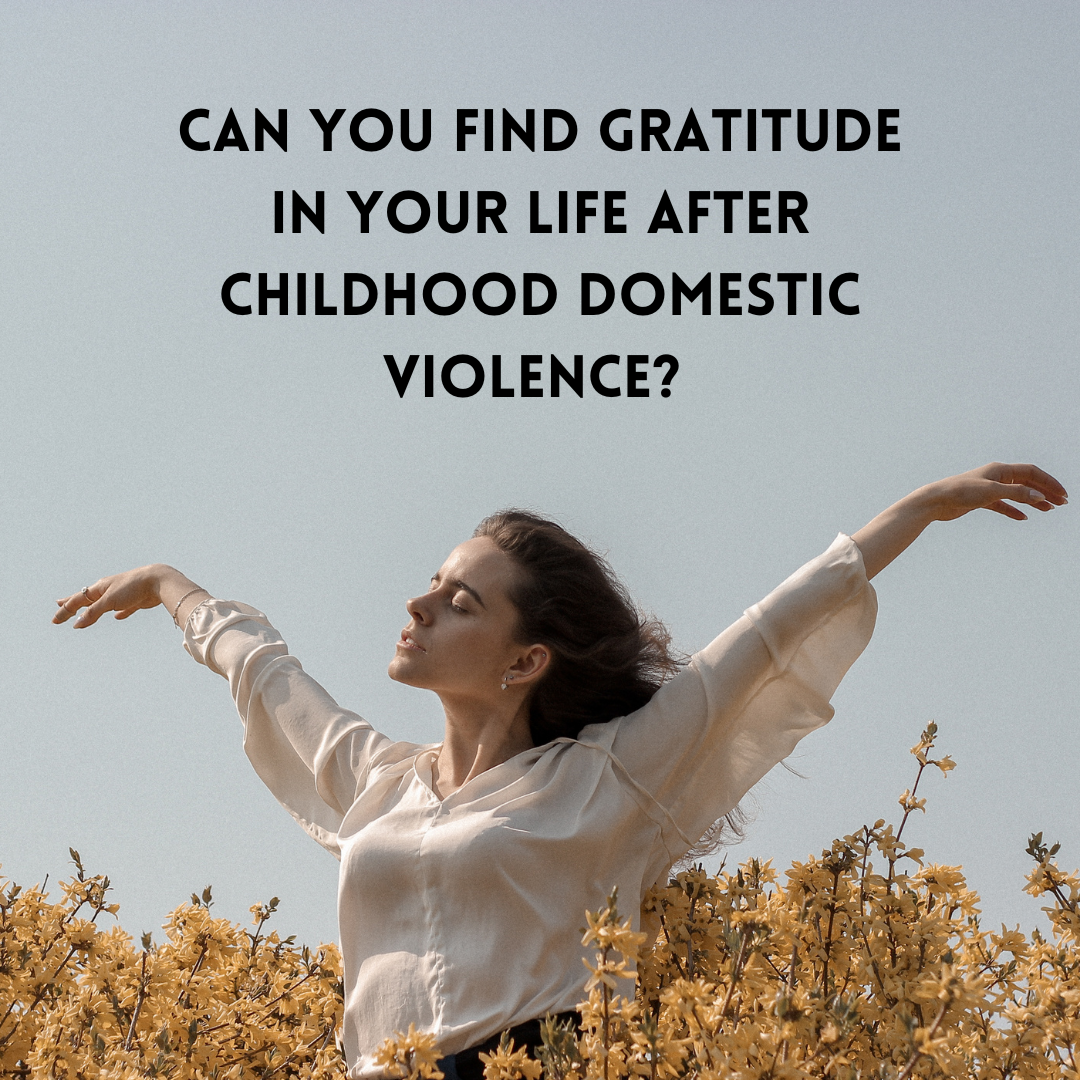For those that faced violence in their childhood, called childhood domestic violence (CDV), being grateful and finding reasons for gratitude in day-to-day life can be very hard.
Gratitude can be hard to come by for all of us at times in our life. Coming from a childhood of domestic violence, many of the simple truths that you should believe in, are ripped from your core.
CDV encodes the brain with negative beliefs that you did not choose as a child, but adults did for you, and does not seek to change the falsehoods. These include the ability to be loved, to trust, to feel worthy, to be confident and to be grateful.
As an adult that lived with CDV, you have the power, more resilience and inner strength than you know. For any adult that made it through a life filled with childhood trauma, you have great potential to still thrive.
You survived your childhood. You had to live with other people’s choices and were left to fend for yourself and feel helpless and alone. What can’t you do after facing such adversity and hardship as a child? Start with one of the truths of CDV: you are capable of being grateful.
Gratitude in itself has its own healing power, transforming negative attitudes and beliefs into positive ones. The path to find more joy in life, to be more grateful for you is very possible.
Use this blog to give you a clear path to learning about the steps you can take to find gratitude:
- Learn about CDV and what it means to you as an adult
- Find a Different Plane: Obtaining Resiliency
- Learn about gratitude & why it can help you heal
- Find joy in life through gratitude
Childhood Domestic Violence and what it means to you as an adult
As an adult who grew up in a violent home, you experienced CDV. You grew up with one of the 10 most prevalent adverse childhood experiences (ACEs). Many out there seeking answers don’t know what an ACE is, or what CDV means to them. Yet, both have consequences for your adult well-being, if you grew up with domestic violence.
Most research and services in the domestic violence field have focused on the victims of violence and abuse. But what about those children that also were in that household, perhaps not being the target, who are now adults?
The Impact of Childhood Domestic Violence on adults
It was not until the past decade or so, that CDV is even being understood and studied. Finally, this not very well known or understood ACE, is being evidenced to have equally damaging effects on mental and physical well-being as having been the target of any form of abuse itself.
Although these survivors are now living their own lives away from the violence, it has left many negative impacts shaped in childhood. CDV impacts finding simple joys in life. These adults have not made the connection of their childhood to their adulthood and may be depressed, anxious, fearful and sad, but not understand why. They know something is missing or not quite right but cannot figure out what the source of their discontent or pain is.
Knowing what CDV is, making the connections of your childhood to where you are and where you would like to be, is the first step to starting your path to self-discovery, recovery and reaching your potential.
Reaching a Different Plane
You are naturally resilient as a child who grew up with domestic violence. You had to be hyper vigilant, on the move, so to speak, many times. The stress levels that you experienced as a child have made you strong, even though you may not feel it. It has given you courage that you may not yet have learned to use. But IT IS THERE INSIDE YOU. It was forced upon you but now you take back control and use these deep strengths.
Psychotherapist Cloé Madanes says,
“People who experience an injustice in childhood, one brought on by their parents, feel a spiritual pain that shapes the unconscious. Because of what they experience, they are able to reach a plane that few humans can, a level of understanding, resilience, and compassion that resides deep inside them.”
Invincible, Brian F. Martin, founder of Childhood Domestic Violence Association
This is what you build from. At this point, you have a greater awareness of what CDV is, what ACEs are, how they all impact you. This knowledge gives you even more power. You learned the brain can be rewired, even at an older age. This high level of awareness is your means to move forward from adversity and take control of all the areas of your life.
Build Resiliency
Cleanslate has put together a list of some helpful ways to build resiliency as an adult. They liken building resilience to building muscle. It takes time and purpose. They also stress what we believe is true, if you are reading this, you are already on the path to self-healing from the childhood trauma you went through. The list includes:
- Embrace change
- Avoid negative thinking
- Focus on what you can control
- Be active
- Be proactive
- Be hopeful
- Believe in yourself
- Practice self-care
- Ask for & accept help
- Find a support network
- Practice gratitude
The truth of gratitude and the lie of sadness when it comes to CDV
The concept of gratitude is the idea of what you can be thankful for in life. It may not always be a solitary feeling, but one that is shared – be it with another person, nature, or a higher power. It can be applied to the past, present, or future and can also be cultivated.
Gratitude helps people to appreciate what they have rather than think about what they don’t have. It has been associated with greater happiness, enabling those who express gratitude regularly to have more positive emotions, build stronger relationships and have better overall health.
Maybe looking back at your childhood you have a sense of sadness. You may call it depression or a sense of loss, or feeling let down. The people that were supposed to care and love you didn’t. These feelings can continue into adulthood. People disappoint you and you just figure this is what happens to someone like yourself.
| These sensations and attitudes make gratitude hard to attain. You may ignore that there are people you know, or even those you don’t know that want or can help you face your sadness. It is for this reason that you must, if only in the beginning, deliberately ingratiate gratitude into your life and create new habits. |  |
“Numerous studies have shown that gratitude for the more positive aspects of our lives is the key to arriving at a new truth. It’s not so much a feeling as an attitude that we can consciously cultivate and that brings real and measurable benefits to our mental health.”
Invincible, Brian F. Martin, founder of Childhood Domestic Violence Association
Gratitude is in you
Sometimes when all the focus is on yourself, it is overwhelming. You see pain and negativity everywhere because that is where the state of your mind is and may be for many years after experiencing CDV. The concept of gratitude seems unreal.
Despite this, take a closer look at yourself right now. You have the truth in hand and are intent on learning and seeking awareness. You are learning about CDV, resiliency and making connections. Now you know that what you lived through impacted you as much as the family member that may have been the target. This knowledge forges a path to change.
Many people can discover gratitude by helping others. With the sense of helplessness, fear and feeling alone that comes from CDV, you now have the capacity to help others avoid these symptoms by simply communicating and sharing. You are more self-aware of not hurting the feelings of others. You have great compassion inside of you that has built up from your experience.
The past doesn’t have to be the future
You lived a lifetime by the time you hit your teenage years. Moreover, it was a tough lifetime, but you can pull from the experience to be grateful for what you have now. It is this adversity that you faced, with your body and mind not even fully developed, that you can take control of both now. Sadness will creep in, as it does for anyone who faced ACEs or even for those who didn’t but your life no longer has to be consumed with chronic sadness and depression. You now have the knowledge that your childhood does not any longer need to dictate the future.
——————
Try these things – discover your capacity to be grateful (provided by our founder, Brian F. Martin):
- Remind yourself that you know the truth. You are in control of your life and for this are grateful.
- You can focus on others – gratitude is helping without expectations of anything being returned- it can be as simple – you can call someone you thought about, or someone you may think needs a chat
- Ask what are you grateful for? Do this every day
- Be kind to others- do not let those who dictated your childhood dictate who you become
- Find tasks that can help others – it can be as little as an hour a month of your time

